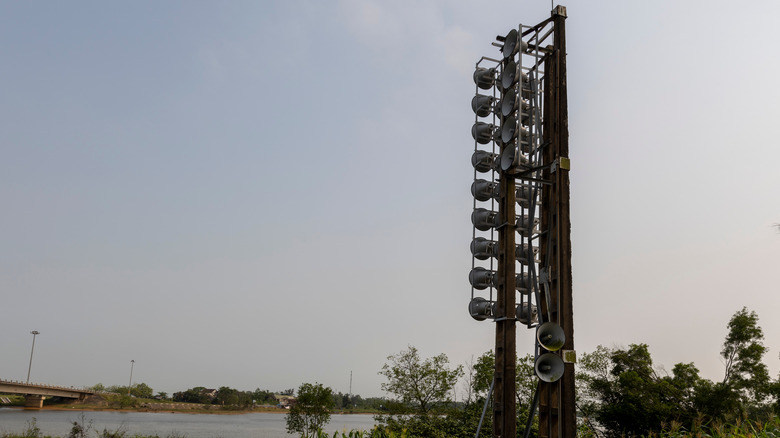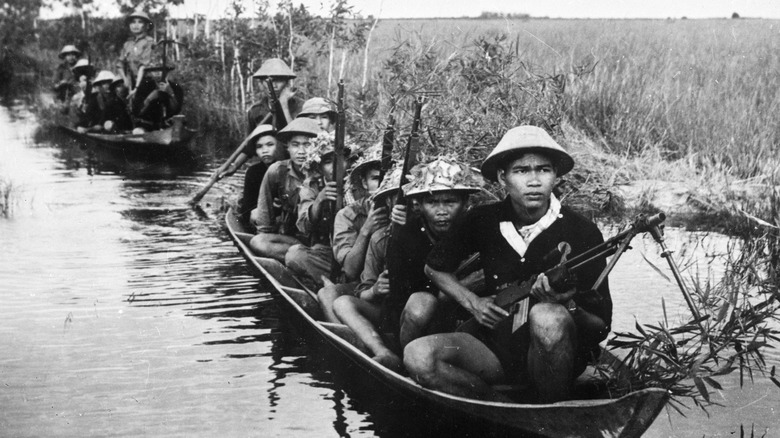Operation Wandering Soul: The Terrifying Ghost Tapes Of The Vietnam War
Psychological warfare is nothing new — it goes all the way to ancient times when Cyrus the Great used it in battle against Babylon. The tactic is generally considered successful if it manages to demoralize or break an enemy in one way or another. There are two forms of psychological warfare: strategic and tactical. Strategic psychological warfare generally involves a large communications operation over a vast audience. Tactical psychological warfare is used directly with combat operations, which hopefully results in surrender (via Britannica).
The United States military is not above using psychological warfare. The Army explains that such missions are to share "specific information to foreign audiences to influence the emotions, motives, reasoning, and behavior of foreign governments and citizens," and forms of it include cyber warfare and "advanced communication techniques across all forms of media." One of the key missions of psychological warfare is to deliberately deceive and mislead the enemy.
Propaganda is a form of psychological warfare
Deception during war is not always easy, but some believe it's necessary. Sun Tzu explains in "The Art of War" that all warfare is based on deception. He wrote, "[W]hen we are able to attack, we must seem unable; when using our forces, we must appear inactive; when we are near, we must make the enemy believe we are far away; when far away, we must make him believe we are near."
Propaganda is one way governments can deceive people. The U.S. Central Intelligence Agency describes three types of propaganda: white, black, and gray. With white propaganda, the source is known and "gentle persuasion" is used to elicit a desired response. Black propaganda is straight-up lies attributed to false sources. Gray propaganda can be truthful (or not), but the source is never revealed. Leaflets are a common form of propaganda, and during World War II, the U.S. dropped around 8 billion leaflets, which included instructions for enemy soldiers on how to surrender, per Britannica.
Aside from leaflets, propaganda can be communicated through movies, newspapers, videos, and on the radio. During the Vietnam war, the U.S. military also experimented with a rather strange and creepy form of psychological warfare against enemy soldiers, and it centered around particular beliefs the Vietnamese had about the afterlife (via The War Zone).
The military used ghosts as a psychological tactic in Vietnam
Such beliefs centered around the notion that the souls of the dead wandered among them. One idea, in particular, was that the dead must be buried in their homeland or their souls would drift on the earthly plane suffering in pain.
Another popular belief among the Vietnamese was that the souls of those who suffered violent deaths or those who were buried without a proper burial could also wander aimlessly. In addition, the Vietnamese also believed that random, "errant" souls wandered the earth, causing misfortune among the living (via Psywarrior).
Armed with this cultural knowledge, the military believed that using ghosts could be an effective tactic against the Viet Cong, reports The War Zone. So it came up with "Operation Wandering Soul," a campaign meant to trick enemy soldiers into thinking that the souls of the dead were attempting to communicate with them.
The military recorded ghastly sounds
The recordings used by the U.S. military in Vietnam included strange cries of women and children, as well as eerie howling noises (via Psywarrior). Some of the voices reportedly were of dead Viet Cong soldiers speaking to their comrades.
A tape called "Ghost Tape Number 10" is reportedly one example of some of the sounds used, and it includes voices saying, "It's hell ... I'm in Hell!" Other voices reportedly urged the soldiers to leave their positions while others called upon them to stop fighting or defect. A video of some of the sounds reveals a voice reportedly saying, "My friends, I come back to let you know that I am dead ... I am dead." Yet another voice pleaded with soldiers to go home before it was too late (via The War Zone).
In 1965, the 6th Psychological Operations Battalion of the U.S. Army was initiated in Vietnam. The War Zone staff reports the U.S. Army and Navy utilized many of these recordings until 1970.
They played the recordings all night long
Most of the recordings were broadcast at night from helicopters and Swift boats. Foot soldiers wearing loudspeakers on their backs also snuck into enemy regions, per The War Zone. Some speakers were hung from tree branches deep in the forests. The military would begin playing the sounds at 8 p.m. and play them all night long. According to Psywarrior, the locations varied each night, and volumes were adjusted to make the voices seem closer or farther away.
Simon Adler, host of Radiolab's "Mixtape," says the recordings were meant to "target the deepest fears of the Vietnamese people," and they seemed to work because word about the chilling noises — or ghosts — eventually got out. In fact, U.S. soldiers heard stories about certain areas being haunted by the souls of the dead. In addition, some Vietnamese farmers were reportedly hesitant to work near areas where some of the broadcasts were heard (via Psywarrior).
Was Operation Wandering Soul effective?
It's not clear how exactly successful Operation Wandering Soul was. Some accounts showed evidence of success. For example, a tape of a tiger allegedly caused 150 Viet Cong soldiers to abandon their posts. Another occurrence resulted in five Viet Cong soldiers surrendering. Other tapes reportedly terrified not only soldiers but civilians, per Psywarrior.
That said, some reports weren't so positive. In one instance, Vietnamese marines fighting the Viet Cong dropped their weapons while hearing the noises. One report described an incident where Viet Cong soldiers opened fire in the direction of a helicopter broadcasting the sounds; another similar account claimed Viet Cong soldiers shot rockets at Swift boats in response to the recordings.
As a result of being fired upon, U.S. soldiers in the boat stopped playing the sounds and resorted to playing Tina Turner instead. However, when the Viet Cong fired their weapons toward the sounds, they revealed their location, which ultimately worked in favor of the U.S. (via The War Zone).





